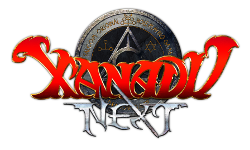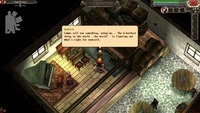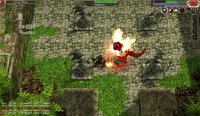|
|

|
PLATFORM
|
PC
|
BATTLE SYSTEM
|

|
INTERACTION
|

|
ORIGINALITY
|

|
STORY
|

|
MUSIC & SOUND
|

|
VISUALS
|

|
CHALLENGE
|
Moderate
|
COMPLETION TIME
|
Less than 20 Hours
|
|
OVERALL

|
+ Moves effectively and fast
+ Meaningful sense of progression
- Inventory is a pain to manage quickly
- Targeting is not 100% accurate
|
Click here for scoring definitions
|
|
|
Falcom's original Xanadu had nothing to do with the 1980 Olivia Newton-John movie, and Xanadu Next continues that trend of not being inspired by a ridiculous musical. Next plays nothing like Falcom's first Xanadu — from before action RPGs had much of an established template to work with — managing to be a solid title in the hack and slash vein. Certain aspects of its interface still produce unhappiness, but the action itself is rather entertaining.
Xanadu Next's protagonist is a mute knight exploring a river island with the young scholar Char. This knight quickly runs into a problem in the form of a treasure is claimed by another adventurer, whose refusal to abandon the stage leaves behind a mortally wounded protagonist. Instead of perishing, the knight is revived temporarily and given the task of finding the blade Dragon Slayer in order to ensure his survival is not promptly undone. Doing so requires investigating the numerous locations around the island where there are plentiful signs of an ancient evil's revival.
Narrative is not the primary concern of Xanadu Next, but what is presented is given a solid localization by XSEED. Considerable lore is presented that links this title to others in Falcom's wide-ranging Dragon Slayer universe, but most of the other games were either never brought out of Japan or were localized long enough ago that continuity is difficult to establish considering the lower translation standards of the 1980s. As background information the narrative works, yet it fails to be gripping on its own.
When traipsing through dungeons the hero will be using hand-to-hand combat most of the time. Every enemy takes extra damage if struck in the back, but will quickly turn around and retaliate, forcing a lot of movement to occur. Cramped environments often make it hard to keep track of every enemy simultaneously, and a good variety of opponents requires the player to adjust tactics frequently. A few environments feature breakable objects that take blows instead of the opposition though, which can result in strikes hitting the wrong target. Xanadu Next does a good job of varying its locales too, and keeps things moving steadily so that no area becomes monotonous.
 Not to worry, because you won't have to think one iota about that!
Not to worry, because you won't have to think one iota about that!
|
|
Levels make a substantial difference in the hero's ability to progress, but nearly as important is the player's decision of where to allocate statistic points. Each piece of equipment comes with a requirement for statistics, and unless this is met the hero cannot equip something even if it would be a dramatic improvement. New swords come with skills that can be learned through repeated use yet are initially available only when the weapon is equipped, and many of these new abilities make a substantial difference in how to approach combat. Magic is also an option, through spells learned from books purchased or dropped in the field, yet only four slots are available for concurrently active abilities and magical incantations. Another combat option revolves around twelve guardians in the game, each of which enhances something different from equipment effects to experience gained but can only be changed back in the hub town. Thus a wealth of options are around for combating the enemy, and experimenting with them is a fruitful pastime.
Direct combat functions have been mapped to a controller, but altering the selected abilities or items requires entering menus. This needs to be done in real time and is an intentional part of the game design, but needing to hurriedly shift to the mouse for toggling options when the controller normally does the job is an irritant. Running around an area in an attempt to provide a moment of peace so that an ineffective skill can be switched using the mouse is much more irksome than necessary due to this control peculiarity. Fortunately it is possible to pause the game, but this cannot be done while shifting inventory contents.
There are only items for healing, and these can only be held in limited quantities. Xanadu Next is kind when defeat arrives however, allowing the player to restart in town minus half the current money and a few perishable items. Certain enemies are nasty foes and bosses can be brutal, but the game is never unfair in administering a beating to the player. A few block-pushing puzzles are trickier than vanquishing the opposition, so the fact that the nastiest ones are optional is welcome. Xanadu Next is also fairly compact, with only a challenging bonus dungeon to possibly provoke a playing time beyond twenty hours.
 I always wondered what kind of salamander is happy to live in lava. The answer: one that wants you dead.
I always wondered what kind of salamander is happy to live in lava. The answer: one that wants you dead.
|
|
Having been released originally in 2005, Xanadu Next's looks are not state of the art. They are nevertheless effective most of the time at depicting the game world and differentiating its dungeons, though it is possible to be confused when enemy depictions that look almost identical to those earlier are used for substantially stronger opponents. Falcom's typically solid soundtrack composition is present to make exploring dungeons more entertaining, yet a few enemy death screams become obnoxious after repeated presentation.
This is not a revolutionary title that set the Japanese gaming world on fire and crossed the Pacific with spectacular expectations. Xanadu Next is instead a game that had to wait eleven years after its original release to cross the Pacific (unless the N-Gage release played by approximately seven people counts), but at least it's a solid title. Falcom tends to deliver worthy action RPGs, and this one is definitely worth experiencing for anyone interested in hacking and slashing to victory.
Review Archives
|









